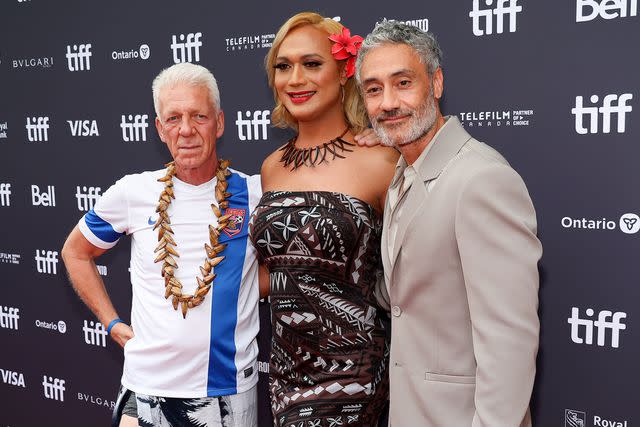Trans Soccer Star Jaiyah Saelua on Bringing Her ‘Fa’afafine’ Identity to the Screen in “Next Goal Wins” (Exclusive)
Taika Waititi’s ‘Next Goal Wins’ introduces audiences to American Samoan culture, including its third-gender fa’afafine community

Presley Ann/Getty; Hilary Bronwyn Gayle/Courtesy of Searchlight Pictures
(Left to right:) Jaiyah Saelua and Kaimana in "Next Goal Wins"Taika Waititi’s new movie Next Goal Wins tells the real-life story of American Samoa’s men's soccer team — infamously one of the world’s worst — and their quest to qualify for the 2014 FIFA World Cup with the help of coach Thomas Rongen (Michael Fassbender).
But along with immersing audiences in the natural beauty and cultural quirks of American Samoan culture, Waititi’s comedic retelling of the 2011 documentary of the same name serves as an introduction to another of the island nation’s legacies: its third-gender community, known as fa’afafine.
“The idea of fa'afafine is really, I think, one of the most important things that comes out of this film,” says actor Kaimana, who plays team member Jaiyah Saelua.
Related: Taika Waititi Reveals Wife Rita Ora Proposed to Him: ‘I Said ‘Yes’ Instantly’

Courtesy of Searchlight Pictures
Kaimana in "Next Goal Wins"Considered by FIFA as the first out transgender woman to compete in a World Cup qualifier, Saelua has blazed trails within the sport, speaking candidly about her transition and wearing make-up at every match.
Now a coach and FIFA ambassador for equality and LGBTQ athletes, Saelua continues to take every opportunity she can to bridge the gap between indigenous understandings of gender identity and the Western world’s.
“I'm very proud of my fa'afafine identity, and I will preach it everywhere I go,” the 35-year-old athlete tells PEOPLE. “But I'm also very proud that I'm a transgender woman who has chosen to transition, who has chosen to take up the responsibility of being the voice of trans athletes around the world.”
The literal Samoan translation of fa’afafine — “in the manner of a woman” — “might sound controversial when you hear it from an outside lens,” she explains. “But ‘in the manner of a woman’ suggests that we are not women, and it also suggests that we are different from men. We are not a non-binary identity. We are a both-binaries identity.”

Leon Bennett/Getty
(Left to right:) Thomas Rongen, Jaiyah Saelua and Taika Waititi in 2023Related: Surfer Bethany Hamilton Speaks Out Against Policy Allowing Transgender Athletes in Female Category
The third and fourth Samoan gender identities, fa’afafine and fa'afatama (“in the manner of a man”), stem from their integral place in Samoan culture.
“The foundation of our culture is respect, ‘fa'aaloalo,’” continues Saelua. “We have responsibilities that are traditional, that are still being practiced and recognized. We are respected by our communities, even our churches, our government leaders, just everyone.”
In fact, fa’afafine are such an accepted part of the island community, Saelua didn’t have to justify or contextualize her gender identity for others until she left American Samoa for the United States.
“The idea of discrimination was just new to me,” she admits. “I was introduced to the idea that in order to live a comfortable life being born a male and then growing up and living feminine, you have to try to be as passable as possible. The pressure of that was introduced to me.”
That struggle to reconcile indigenous identity with Western ideologies is one of the subplots in Oscar-winner Waititi’s film. Saelua (as played by Kaimana) is deadnamed by Fassbender’s Rongen and teased by an opposing team.
“Those are actual experiences that trans women in Western societies face and I thought it was important that audiences see that,” says Saelua, who adds that she “loved” the movie.
Related: Rita Ora and Taika Waititi Share Never-Before-Seen Photos from 'Blissful' Wedding One Year Later
“There was a sense of trust for me as a Samoan fa'afafine, as a Pacific Islander, that it was Taika that was doing this. He is a Pacific Islander, and he understands the sensitivities of certain issues that he knows not to joke about.”
By incorporating elements of Saelua’s real-life story into its script, Next Goal Wins reminds audiences around the globe that “expressions outside of the binary are not a new thing,” says Kaimana, 34. “Fa'afafine is something that has existed for a time immemorial. Its roots are ancient.”
Born in Hawai’i and to a father with Samoan roots, Kaimana, like Saelua, identifies as fa’afafine — and much more. “I feel like a very complex being just by nature of being human,” says the actor, who goes by she/they pronouns. “And I think that's for everybody.”
Growing up in Hawaii, California and Utah, Kaimana understands all too well the “pressure to find one label to pigeonhole yourself into,” as she puts it. “The concept of ‘identifying’ is honestly very unique to the Western world. Whereas within a lot of indigenous spaces, you just are who you are… without any explanation whatsoever.”
She adds, “My experience is quite expansive and it covers a wide range of things. I'm proud to say that I'm a trans woman, just as I'm proud to say I'm transfeminine, just as much as I'm proud to say I'm non-binary, just as I'm proud to say I'm a woman. Every single one of those labels and experiences, I identify very heavily with each one.”

Amy Sussman/GA/The Hollywood Reporter via Getty
Kaimana and Taika Waititi in 2023Related: Canada Midfielder Quinn Becomes First Out Transgender Athlete to Play in a FIFA World Cup
With Next Goal Wins bringing Saelua’s singular experience to audiences around the world, Kaimana hopes it will prompt viewers to think about gender as something other than a strict binary.
“I think everybody deserves to be afforded, obviously, the same room for exploration [as myself], the same ability and right to be able to identify as they will,” says the actor. “Because if you grew up in a world and a language where you only have two options, then I'm like, ‘Hello, that's not going to work!’”
Next Goal Wins, costarring Oscar Kightley, David Fane, Rachel House, Beulah Koale, Will Arnett and Elisabeth Moss, is in theaters now.
For more People news, make sure to sign up for our newsletter!
Read the original article on People.


